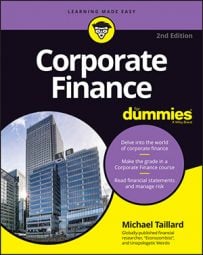A forward in the world of corporate finance is an agreement between parties to perform a sale of a specific type of good in a predetermined quantity at a predetermined price at a predetermined date in the future.
Unlike options, which give either the buyer or the seller the right to participate in the transaction but do not obligate them, forward contracts are legal obligations to perform the transaction on or before a specific date. The good thing about forwards is that they’re very customizable and can include any details or additional terms as long as all the relevant parties agree to the terms.
Forward contracts aren’t bought and sold in the same manner as many derivatives contracts. Rather, two or more parties develop a legal contract, sign into that contract, and typically fulfill the contractual obligations themselves. So neither party purchases or sells the actual contract (unless you count the fees for having the contract drawn up).
Say that Janna wants to buy 200.5 pounds of wool. The industry standard is to sell wool only by the pound, not divisions of a pound. Janna is afraid that the price is going to increase before this season’s cuttings (the wool term for crop), so she goes and talks to the farmer who produces the wool.
Janna and the farmer agree to a forward contract because the farmer is afraid that the price may drop. These are the terms of their contract:
Product: White lamb’s wool, first cutting of the season, carded
Quantity: 200.5 pounds
Delivery Price: $1,500
Delivery Date: February 28, 2013
Both parties in the contract must execute their part in the contract, and the contract itself is likely to include penalties for nondelivery. Note that in the preceding example, the quantity agreed upon is 200.5 pounds, despite the industry standard of selling in increments of 1 pound. This high customizability is one of the primary benefits of a forward contract.
Risk management and forward contracts
The reason companies and individuals enter into forward contracts is to reduce the amount of price uncertainty and volatility, particularly seasonal volatility, involved with buying or selling goods. Forward contracts allow buyers and sellers to agree upon a price and quantity of goods to be exchanged, sometimes even before production has begun.
For buyers, not only does this arrangement provide increased certainty that they’ll get exactly the quantity they need without competing with other buyers for the same pool of suppliers, but it also guarantees that the price won’t increase by the time of the delivery date.
For sellers, forward contracts not only ensure that they’ll have a buyer for their products rather than risking being left with a surplus but also guarantees that the price won’t drop suddenly before the delivery date.
On both a national scale and a global scale, the use of derivatives in managing risk means price stability. Many goods around the world, particularly primary goods such as agriculture, experience seasonal fluctuations. During harvest season, the quantity of goods supplied increases quite a lot, while during the off-season, the quantity drops below demand.
These fluctuations in supply cause serious seasonal price volatility. Derivatives in general help alleviate this volatility, and forwards are easily the best method for addressing the individual needs of both buyers and sellers.
Revenue generation with forward contracts
Generating revenues with forward contracts is somewhat more difficult than doing so with most other forms of derivatives. Because forward contracts are so customizable, they aren’t conducive to trading. After all, finding another buyer who wants the exact same contract you created to fit your needs and those of the other party can be nearly impossible.
There’s really only one common way to generate revenues from forward contracts, but you have to be particularly confident in your assessment of the future prices of goods.
As a buyer, you can enter into a contract that has a price very low compared to your estimate of the future market price (also called the spot rate), get your inventory of goods, and then resell them at the market price. If you’re a seller, you can simply enter into a contract that has a price much higher than your expected future market price.
Valuation of a forward contract
The value of a forward contract depends greatly on the fluctuations in the market price of goods. You can use a number of different calculations to determine the value of a forward contract, but generally speaking, each calculation is built on the following two basic ideas:
The current price of a forward contract should be equal to the market price of goods at the delivery date plus the opportunity cost associated with not pursuing the next best opportunity. For example, if you’re an investor, then the price of the forward contract today should be equal to the market price at the date of delivery plus the market rate of compounding interest.
Of course, you can’t know exactly what the future market price will be (if you could, forward contracts wouldn’t serve much purpose). That degree of uncertainty is where people attempt to generate income by speculating.
At the time of delivery, the value of the forward rate is equal to the delivery price minus the market price. This is a rather simple hindsight measure that determines how effective you were at utilizing forward contracts.

